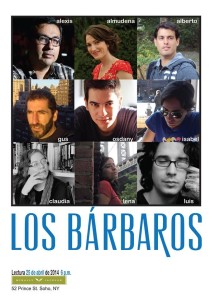Peruvian writer Ulises Gonzáles founded the thrice-yearly journal Los bárbaros in 2014. Gathering work from Spanish-language writers about New York, Gonzáles talks about the important role of New York City for contemporary writers in Spanish and his hopes for the journal’s future.
Eric Becker: How did the journal come to be?
Ulises Gonzáles: It’s a great story, actually.
Some of us were in a class at the CUNY Graduate Center and someone mentioned something about the poem “Waiting for the Barbarians” (by the Greek poet C.P. Cavafy). But that person connected it to the idea that now the barbarians are major figures in language and literature departments (throughout the world) and were creating their own literary theories and not leaving it just to the French anymore—because of people like Borges.
And today, for example, people in English departments are reading Borges and it was all about this idea that now the barbarians are in charge. The reach of English is still, of course, broad. But one thing that I like about these Latin American writers is that every one of them is going to tell you that among their favorite writers are maybe Faulkner, maybe Hemingway, maybe Wilde. There’s a big connection: it’s like “I got all this from English literature, I’m going to recycle it and I’m going to tell you about my world through what I learned and at the same time I’m going to teach you something about my world.”
EB: Can you tell us a bit about the magazine?
UG: We publish poetry, short stories in Spanish, and the idea is that we’re working in New York, we’re talking about New York, from New York.
EB: What made you decide there was a need for a journal like yours, and what, ultimately, do you hope the contribution of Los bárbaros will be?
UG: This is a time for Latin American writers where New York plays a very important role. This is the city where they meet. Sometimes they come just to talk about their books, sometimes they stay in New York for long periods of time, to study or to work. New York is what Paris was for American writers at the beginning of the 20th century. There is an amazing amount of Latin American writers who only write in Spanish and there was no magazine in the city to publish their work or just to be the witness, and keep a record of what is happening. That is the importance of Los bárbaros.
EB: You’ve launched the journal in New York and will launch it officially at the Lima Book Fair in July—where, ultimately, do you hope to expand?
UG: Every good writer wants to reach every possible audience. We are starting in Spanish and our natural market is readers in the U.S., Latin American and Spanish readers in their own countries. I want the magazine to be read everywhere, the same way SUR by Borges was read by the intellectual circles in Buenos Aires, Mexico, Bogotá, Madrid. Or the same way Poetry magazine reached lovers of poetry in the U.S. and in Europe. I want the magazine to be translated into English in the future and to get collaborations from writers from every country in Latin America and Spain. Of course, there are writers from other languages whose experience maybe is similar to the ones of Latin American writers coming to New York. Maybe we could print some of those stories. Maybe they also consider themselves “Bárbaros” in New York.

EB: Is your focus on emerging or established writers?
UG: My focus is on emerging writers. However, for the good fortune of our readers, even established writers like Juan Villoro or Yuri Herrera would tell you that they consider themselves part of an independent circuit, outside the big market for “established” writers. All of them need other jobs than writing in order to survive. Maybe this is because the market for readers of literature in Spanish never has been huge. You could think Borges was an established writer. However, if you have asked him if he considered himself one, when he was 40 or even 50, he would have told you that nobody read him, that not too many people were buying his books. And he was right.
EB: What do you hope the journal can accomplish being based out of New York that you think it may not have been able to accomplish if it were based elsewhere? Who is the target audience?
UG: My audience is the readers of literature written in Spanish around the world. New York is the center of this movement of writers coming and going all the time, probably not only in Spanish but in many other languages. There is something very cool about a magazine created and published in New York. I am hoping to use the magazine to reach every reader, to let everyone read our writers, get to know the work of our illustrators, photographers and cartoonists. And maybe a good translation of them would open the English market, and other markets, for their work. Recognition is everything: my writers can then go somewhere else, they can have their own careers. I would love some of them to be known as poets and writers in New York—this also helps them when they go back to Montevideo or Lima.

EB: Do you envision making the magazine bilingual?
UG: I do not like bilingual magazines, maybe online. If I read The New Yorker I want to be able to read it in English, not with the Spanish translation on the side. I would prefer an English version of Los bárbaros, a translation of the writers and comic artists published in the original Spanish version. I want it. There are circles of independent American writers, in New York, where we need to participate. Because most of the writers in Los bárbaros write in English, they have lived long enough in New York to read and talk perfectly in English, therefore, we need to get more involved in those independent circles. We need to send our writers and poets to read their work in front of English-speaking audiences. We need to do that. That is definitely in the future of the magazine.
***
Ulises Gonzáles published his first novel, País de hartos, in 2010. He has worked as a correspondent for La Opinión de A Coruña (Spain). His short stories have been published in the magazines Revista de Occidente, Luvina (Guadalajara University, México), Renacimiento (Sevilla), and The Barcelona Review. He writes the weekly blog Newyópolis for the magazine Frontera D (Spain) and for his own literary blog, The New York Street. He has received awards for his writing and his graphic stories. He has published literary critical essays in the magazine Hueso Húmero (Lima). He is in the process of publishing his collection of short stories, Acerca de Alfas and the literary magazine Los bárbaros.
Eric M. B. Becker is a writer, translator, and award-winning journalist from St. Paul, Minnesota. He has recently published translations of Brazilian writers Edival Lourenço, Eric Nepomuceno and Carlos Drummond de Andrade, as well as 2014 Neustadt Prize winner Mia Couto, in The Massachusetts Review, MobyLives, and Asymptote. In 2014, he was recipient of a Louis Armstrong House Museum Residency. He also serves as assistant managing editor at Asymptote.

